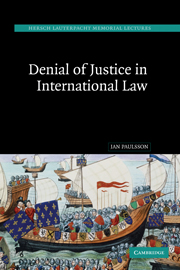Book contents
- Frontmatter
- Table of Contents
- Acknowledgements
- Authorities
- Abbreviations
- 1 The renaissance of a cause of action
- 2 The historical evolution of denial of justice
- 3 Three fundamental developments
- 4 The modern definition of denial of justice
- 5 Exhaustion of local remedies and denial of justice
- 6 Denial of justice by outside interference
- 7 Denial of justice by the decision-maker
- 8 Remedies and sanctions
- 9 The menace of ‘obscure arbiters’?
- Bibliography
- Index
4 - The modern definition of denial of justice
Published online by Cambridge University Press: 29 July 2009
- Frontmatter
- Table of Contents
- Acknowledgements
- Authorities
- Abbreviations
- 1 The renaissance of a cause of action
- 2 The historical evolution of denial of justice
- 3 Three fundamental developments
- 4 The modern definition of denial of justice
- 5 Exhaustion of local remedies and denial of justice
- 6 Denial of justice by outside interference
- 7 Denial of justice by the decision-maker
- 8 Remedies and sanctions
- 9 The menace of ‘obscure arbiters’?
- Bibliography
- Index
Summary
Overview
We have seen that the concept of denial of justice was once often used as the rhetorical excuse for interventions by foreign governments acting on behalf of their nationals to obtain reparation for alleged violations of their rights. The triggering event might be any action deemed to breach international law, whether or not related to the administration of justice. Forcible intervention was thus justified by the complaint that the initial wrong had not been repaired by national judicial processes.
One consequence of this usage of the expression was that some scholars concluded that it applied only to instances of refusal of redress, so that it would cover failure or extreme delay in the hearing of a complaint, but not cases of miscarriage of justice affecting defendants. If the latter were international wrongs, it was said, they would have to be known by some other appellation such as ‘manifest injustice’, because they were not properly to be understood as justice denied, but as justice wrongly rendered.
To compound the confusion, some writers and indeed adjudicators concluded that denial of justice could never be a primary wrong, but could only be present when the initial wrong, whatever it may have been, was followed by a failure to correct it. The ensuing habitual coupling of denial of justice with every type of international wrong was doubtless an even more serious consequence of the use of the expression denial of justice to legitimise the use of force.
- Type
- Chapter
- Information
- Denial of Justice in International Law , pp. 57 - 99Publisher: Cambridge University PressPrint publication year: 2005
- 1
- Cited by

